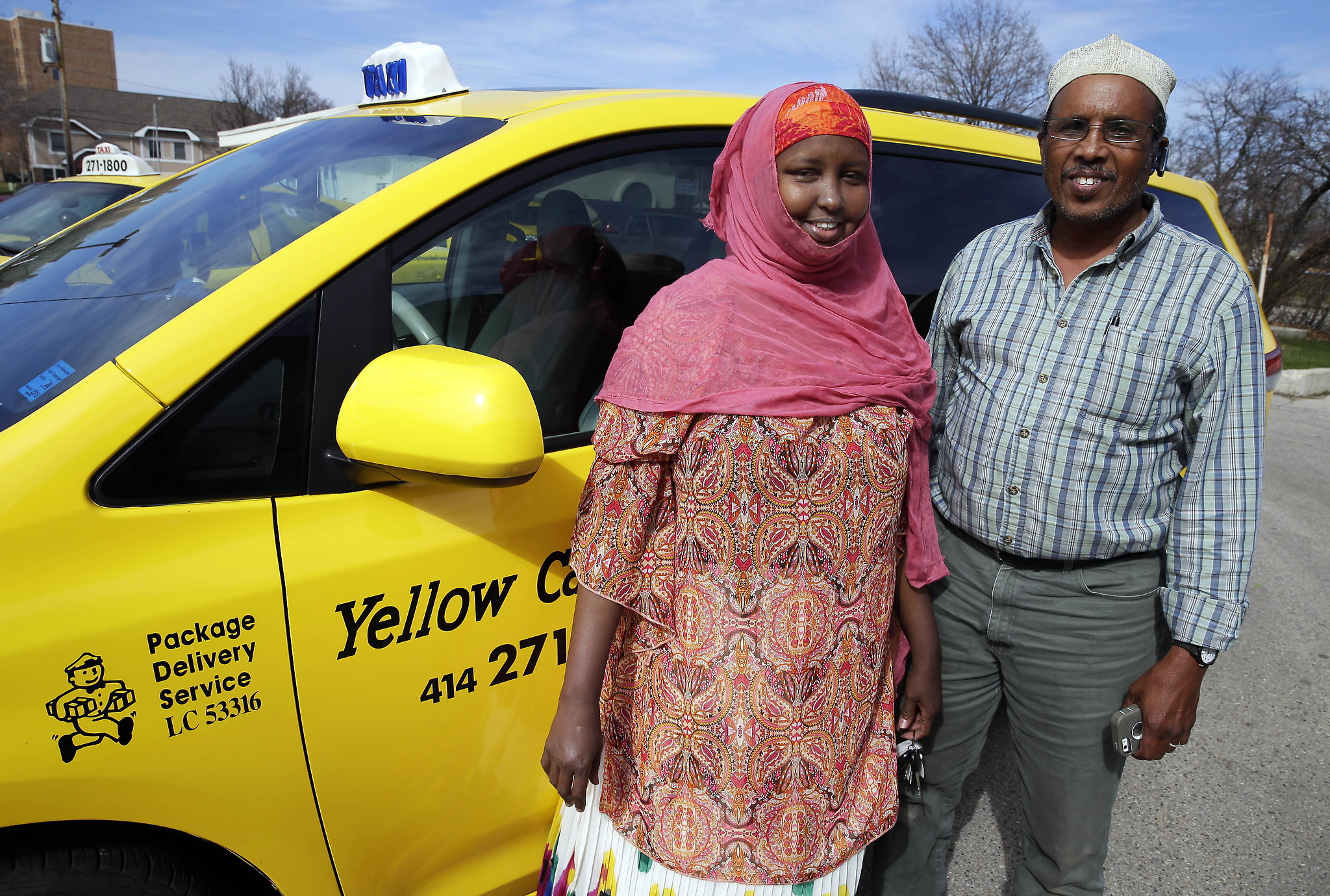
Suleqa Isakh, 35, is thought to be one of just two Muslim women locally who drive cabs. She tools around the city six, sometimes seven, days a week in a yellow 2011 minivan.
When Suleqa Isakh slid behind the wheel of a Yellow Cab for the first time in January, not everyone approved.
It didn’t seem right, some of her male Muslim colleagues opined, for a woman of the faith to work in such a way.
Ali Mohamed, president of Yellow Cab Co-Operative, consulted a local imam, who gave his blessing. And now Isakh is one of the more than 180 drivers affiliated with Milwaukee’s Yellow Cab co-op.
“I’m excited to do this,” said a beaming Isakh, her round face framed by a jeweled hijab, the traditional headscarf worn by Muslim women in her native Somalia.
“America is a free country. If I want to be a police officer, I can do it. If I want to drive taxi, no one can tell me I can’t.”
While there have been female taxi drivers in Milwaukee over the years, Isakh, 35, is thought to be one of just two Muslim women locally who drive cabs. (Another works independently.) She tools around the city six, sometimes seven, days a week in a gleaming yellow 2011 minivan that she’s leasing. Hers is the quintessential immigrant story — one of heartache and hope, of hard work and sacrifice to build a new life in a new land.
And, like many immigrants, she remains tethered to those she loves a world away. Isakh lives simply and sends much of what she earns to support her elderly mother, her sister and her sister’s three small children in Kenya.
“I love my mom,” she says again and again, closing her eyes as if to remember her mother’s face. Her hope is to some day bring them to America.
“If only myself, I would not work so many hours,” said Isakh, whose day sometimes stretches from 6:30 in the morning to 3 a.m. the next day. “But I have to support my mom and so many others.”
Born in Mogadishu, Isakh was just 10 when her family fled the civil war in Somalia to the relative safety of nearby Kenya. She spent more than a decade there before immigrating with her older cousin to the United States in 2005.
Two years later, she stood in the cavernous lobby of Milwaukee’s U.S. Courthouse, raised her right hand and vowed her allegiance to her new adopted country.
“I’m a citizen,” she boasts, not three minutes into the conversation. “I love America, honestly,” she says, almost breathless. “I’m a free woman. American woman.”
Isakh threw herself into this new life and all of the opportunities it presented. She took classes in English and got a job in the warehouse of a costume distributor. She went on to work as a dietary aide in an assisted living home for seniors. But, as much as she loved the work and the residents, the $9.40 an hour was just not enough to support six people on two continents.
And so, she cold-called Mohamed, one of the owners at Yellow Cab, and a fellow Somalian immigrant — though she did not know him.
Women drive in Somalia, and in most of the Muslim world. So it’s not a shock to see a veiled woman behind the wheel of a car. Still, Somalia is a traditional culture where in many families women tend the home while men earn a paycheck, Mohamed said. And some of the other Muslim drivers bristled at the idea of bringing on a woman.
Mohamed consulted Zulfiqar Shah, an internationally respected Islamic scholar and religious director at the Islamic Center of Milwaukee.
Some ultraconservative interpretations require that Muslim women not be alone with men who are not members of their own families, for their safety and to avoid any risk of intimate contact, Shah explained.
“But when it comes to two evils, we always look at which is the greater one,” he said. “If she is sitting home depending on the system for food stamps or unable to take care of her family’s needs, that is a greater evil than being in the company of men.
“If her work is secure, it gives her more money, she is protected from being a sexual victim, then this is acceptable,” he said.
Isakh, too, is mindful of her faith and traditions.
She prays throughout the day for Allah to keep her safe.
She still wears the headscarf and the flowing blouses and skirts that cover her arms and legs in public. She runs home at the faith’s designated prayer times, lays down her prayer rug facing Mecca, and bows and prostrates herself in prayerful supplication.
Mohamed says Isakh has really taken to the work.
“I told her, ‘Think twice about it. It’s not an easy job,'” said Mohamed, who’s been driving a cab in Milwaukee for more than two decades.
Many people are friendly and generous, he told her. Others not so much. Mohamed recalls one person, who, after learning he was Muslim, got out of his cab slammed the door and stormed off.
Isakh was undeterred.
“I thought she wouldn’t like it,” Mohamed said. “But she’s doing a good job.”
Isakh hasn’t encountered any of the hostility Mohamed experienced.
In fact, she says, many passengers — especially women — are pleasantly surprised to find a female driver and curious about her hijab.
“A lot of people ask, ‘Where are you from?’ I never have problem,” she says.
And there’s one extra perk: All the interaction has improved her command of her new language.
“This is my joy. … I have many communications every day,” Isakh says. “It’s much better for my life.”
Source: http://www.jsonline.com

One Comment
Leave a Reply